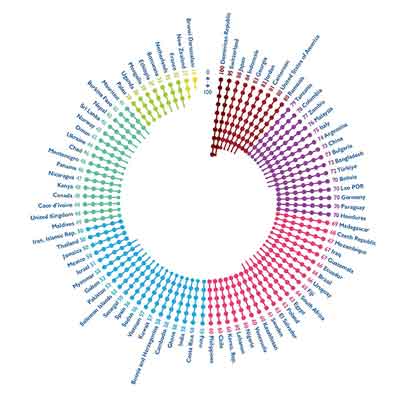
গ্লোবাল টোব্যাকো ইন্ডাস্ট্রি ইন্টারফেরেন্স ইনডেক্স
বড় তামাক কোম্পানিগুলো যে কোন মূল্যে এমনকি জীবন রক্ষাকারী নীতি রুখে দিয়ে হলেও তাদের মুনাফা সুরক্ষিত রাখে। সূচকে কোন দেশগুলো জনস্বাস্থ্য রক্ষায় কাজ করছে তা উঠে এসেছে।

তামাকশিল্প জীবন-রক্ষাকারী নীতিতে বাঁধা দিতে সচেষ্ট।কোন দেশই এর বাইরে নয়।
এই হস্তক্ষেপ বন্ধ করার ক্ষমতা সরকারের রয়েছে।
সময়মতো ব্যবস্থা না নিলে মানুষের মৃত্যু ঘটতেই থাকবে।
২১,৯১৮ জীবন প্রতিদিন
৬৬৬,৬৬৭ জীবন প্রতি মাস
৮,০০০,০০০ জীবন প্রতি বছরডব্লিউএইচও এর হিসাব অনুসারে প্রতি বছর তামাকের কারণে ৮০ লাখেরও বেশি মানুষ প্রাণ হারায়।
কোন দেশগুলো রুখে দাঁড়ানোর চেষ্টা করছে এবং কিভাবে, তার সম্পূর্ণ ধারণা নিন
গ্লোবাল টোব্যাকো ইন্ডাস্ট্রি ইন্টারফেরেন্স ইনডেক্স দেখায় কোন কোন দেশের সরকার বিগ টোব্যাকোর হস্তক্ষেপ থেকে জনস্বাস্থ্য নীতিগুলিকে রক্ষা করার পথে নেতৃত্ব দিচ্ছে এবং কোন দেশের সরকার আরও ভাল করতে পারে৷
অংশিদারিত্বে 
অঞ্চলভেদে প্রবণতা
“সামাজিক দায়বদ্ধতামূলক কর্মসূচি” (সিএসআর কর্মসূচি)
বহু সরকার তামাক শিল্পের পরিবেশ শীর্ষক “সামাজিক দায়বদ্ধতা কর্মসূচি” সমর্থন করেছে, যা তামাক কোম্পানির সম্মানের কালিমা মোচনে সাহায্য করেছে।
কোরিয়ার সুওনের স্থানীয় সরকার কেটিএন্ডজির ২৩টি জনস্থাপনায় ৩৩টি সিগারেটের অবশিষ্টাংশ নিক্ষেপের স্থান স্থাপনের কাজে সমর্থন দিয়েছে এবং কোম্পানির “Sseudam Sseudam” (আবর্জগানাগারে সিগারেটের অবশিষ্টাংশ নিক্ষেপ) কর্মসূচির প্রচারণা চালিয়েছে। পাকিস্তান ও শ্রীলংকার স্থানীয় বন বিভাগ স্থানীয় ব্রিটিশ আমেরিকান কোম্পানির নিয়ন্ত্রণাধীন সংস্থার পৃষ্ঠপোষকতাপ্রাপ্ত বৃক্ষরোপণ কর্মসূচি সমর্থন দিয়েছে। বাংলাদেশের খুলনা বিভাগের মেয়র ব্রিটিশ আমেরিকান টোব্যাকোর পৃষ্ঠপোষকতায় ‘বনায়ন” শীর্ষক বৃক্ষরোপণ কর্মসূচির উদ্বোধন করেন।
প্রভাব প্রতিরোধ
তামাক সেবন হ্রাসকল্পে ব্যবহৃত মোড়ক সতর্কতা বলবৎ করতে অনেক সরকার ব্যর্থ হয়েছে।
গণপ্রজাতন্ত্রী লাওএ তামাকশিল্প তার সিগারেট মোড়কের ৭৫ শতাংশ জুড়ে সতকর্তাবার্তা দেয়ার যে নিয়ম তা পুরোপুরি মেনে চলেনি। মায়ানমারে আন্তর্জাতিক তামাক কোম্পানি এবং স্থানীয় সিগারেট ও চুরুট উৎপাদকেরা তামাক মোড়ক প্রমিতকরণ প্রক্রিয়া চালুর নির্ধারিত সময়সীমা পেছানোর লবিং-এ সফল হয়েছিল। ২০১৭ সালে বাংলাদেশে তামাক মোড়কের উপরাংশে সচিত্র স্বাস্থ্য সতর্কবাণী প্রচার সংক্রান্ত সরকারি আদেশ বাস্তবায়ন পিছিয়ে যায় তামাক উৎপাদন সমিতি কর্তৃক আরও একটি পিটিশন রুজু করার কারণে হাইকোর্ট নিষেধাজ্ঞা আরোপ করায়।
আঞ্চলিক প্রতিবেদন (ইংরেজিতে)নীতি উন্নয়ন
কিছু সরকার তামাক নিয়ন্ত্রণ আইন প্রণয়নে সরাসরি শিল্পের উঁচু পর্যায়ের লবিং ও সংশ্লিষ্টাতার মুখোমুখি হয়েছে।
ক্যামেরুনে, ব্রিটিশ আমেরিকান টোব্যাকো তাদের ভেলো এবং ভুজ পণ্যের উৎকর্ষ বৃদ্ধিতে সরাসরি সংশ্লিষ্ট ছিল,এবং কাজটির জন্য অর্থ সহায়তা প্রদান করেছে। ইথিওপিয়াতে, সরকারি মালিকানাধীন তামাক ব্যবসা বেসরকারীকরণ করা হলেও আইনানুযায়ী শিল্প তামাক নিয়ন্ত্রণের ব্যাপারে মত দিতে পারে। ব্রিটিশ আমেরিকান টোব্যাকো কেনিয়াতে প্রচার করেছে যে নিকোটিন থলির ওপর নিষেধাজ্ঞা বাতিল করে দিতে তারা স্বাস্থ্য মন্ত্রণালয়ের সাথে একমত হয়েছে।
তামাক শিল্পের জন্য সুবিধা
বেশ কিছু সরকার তামাক শিল্পের প্রচারণা ও সমর্থনে কাজ করেছে।
তাঞ্জানিয়ার প্রধানমন্ত্রী তামাক চাষ বৃদ্ধি ও বাজার সম্প্রসারণে জোর দিয়েছেন, অন্যদিকে কৃষি মন্ত্রণালয় তামাক উৎপাদনে দিগুণ করার প্রতিশ্রুতি ব্যক্ত করেছে। সরকার মাদাগাস্কারে, স্থানীয়ভাবে উৎপাদিত ৭০ শতাংশ বা তার থেকে বেশি তামাক ব্যবহার করা সিগারেটে ২ শতাংশ কর মওকুফের ঘোষণা দিয়েছে। কেনিয়ায় ন্যাশনাল চেম্বার অফ কমার্স ও ট্রেড দ্বারা আয়োজিত একটি গোলটেবিল প্রাতরাশ সম্মেলনে প্রধাণ অতিথি হিসেবে উপস্থিত ছিলেন স্বাস্থ্য বিষয়ক মন্ত্রীপরিষদ সচিব এবং কেনিয়ার ব্রিটিশ আমেরিকান টোব্যাকো ছিল এর মুখ্য পৃষ্ঠপোষক।
“সামাজিক দায়বদ্ধতামূলক কর্মসূচি” (সিএসআর কর্মসূচি)
তামাকশিল্পের “সামাজিক দায়বদ্ধতামুলক কর্মসূচি”-তে সমর্থন দিয়েছে বেশ কয়েকটি সরকার।
সুইডেনে ফিলিপ মরিস ইন্টারন্যাশনাল ও আরও কিছু তামাক কোম্পানির অর্থপ্রাপ্ত একটি এনজিও দ্বারা পরিচালিত “Håll Sverige Rent” (সুইডেন পরিচ্ছন্ন রাখুন) শীর্ষক কালিমা মোচনের কর্মসূচিতে সংসদ সদস্যরা উপস্থিত ছিলেন।সুইজারল্যান্ডে, ফেডারেল পরিবেশ দপ্তর প্রধাণ তামাক কোম্পানিগুলোর সাথে অংশীদারিত্ব স্থাপন করেছে এবং দেশব্যাপি সিগারেট আবর্জনা পরিচ্ছন্নকরণ সম্পর্কিত সচেতনতামূলক প্রচারাভিযান পরিচালনা করেছে। তাদের প্রচারিত বার্তার মধ্যে ছিল “” সিগারেটের অবশিষ্টাংশ ঠিক জায়গায় ফেলুন, কেননা প্রকৃতি ছাইদানি নয়””, যে স্লোগানটি অতীতের একটি সুইস তামাক সামাজিক দায়বদ্ধতামূলক কর্মসূচি থেকে নেয়া।
স্বার্থের সংঘাত
চোরাচালান বিরোধী কর্মসূচিতে কিছু সরকার শিল্পকে জড়িয়েছে, যদিও প্রমাণ আছে শিল্প নিজেই তামাক পাচারে জড়িত।
পোল্যান্ডের পুলিশ সদর দপ্তর ব্রিটিশ আমেরিকান টোব্যাকো,পোল্যান্ড এবং পোজনানের ইস্মোকিং ইন্সটিটিউটের সহায়তায় তামাক পণ্যের পাচার বিরোধী একটি প্রশিক্ষণের আয়োজন করে। জর্জিয়ার জাতীয় শুল্ক সংস্থা জাপান টোব্যাকো ইন্টারন্যাশনাল দ্বারা আয়োজিত অবৈধ বাণিজ্য বিরোধী কিছু সেমিনারের মাধ্যমে প্রশিক্ষণ গ্রহণ করে। বসনিয়া ও হারজেগোভিনাতে,পরোক্ষ শুল্ক কর্তৃপক্ষ অর্থনীতিবেদদের সংগঠন এসডব্লিউওটির সাথে এক হয়ে “পাচার রোধ করুন” শীর্ষক একটি কর্মসূচি বাস্তবায়ন করছে, যা ফিলিপ মরিস ইন্টারন্যাশনাল, ব্রিটিশ আমেরিকান টোব্যাকো এবং জাপান টোব্যাকো ইন্টারন্যাশনালের সহায়তাপ্রাপ্ত।
স্বচ্ছতা
সরকারি কর্মকর্তা ও তামাক শিল্পের মাঝে হওয়া যোগাযোগের ক্ষেত্রে অতি প্রয়োজনীয় স্বচ্ছতার বিষয়ে অনেক সরকারের ঘাটতি রয়ে গেছে।
২০২১ সালে ব্রাজিলে, তামাক কোম্পানি তামাকসংক্রান্ত সচিবিক চেম্বারকে কাজে লাগিয়ে পররাষ্ট্র মন্ত্রণালয়ে লবিং করার উদ্যোগ নিয়েছিল যেন তারা নবম কনফারেন্স অব দা পার্টিজে (কপ৯) দেনদরবারে ব্রাজিলের হস্তক্ষেপের বিষয়টি আনে। দুটি অঘোষিত সাক্ষাতে কৃষি মন্ত্রণালয়ের মাধ্যমে সরকারের সাথে তারা লবিং করে যেন কপ৯-এ তামাক উৎপাদনকারীদের সমর্থন দেয়া হয়। কলম্বিয়াতে তামাক শিল্পের লবিং নিয়ন্ত্রণের প্রচেষ্টা সফল হয়নি, কেননা, দুর্নীতি-বিরোধি বিধানে লবিস্টদের ব্যাপারে তথ্য চাওয়ার কথা থাকলেও তামাক শিল্পের নির্দিষ্ট কোন উল্লেখ বা নীতি বলা নেই।
স্বার্থের সংঘাত
তামাক শিল্পের উদ্যোগ তেমন সফল হয় না প্রমাণিত হলেও, কিছু সরকার তামাক উৎপাদনে শিশুশ্রম কমিয়ে আনার শিল্প-সমর্থিত উদ্যোগে সমর্থন জানায়।
শিশুশ্রম বিষয়ে আর্জেন্টিনাতে Fundación Vamos Andar-Programa Brazos Abiertos এর মাধ্যমে সরকারের বিভিন্ন স্তরে যোগাযোগ রয়েছে তামাক শিল্পের।আর্জেন্টনায় প্রতিষ্ঠানটি জাতীয় পর্যায়ে ব্রিটিশ আমেরিকান টোব্যাকো কর্তৃক পৃষ্ঠপোষকতাপ্রাপ্ত শিশুশ্রম বিষয়ক কর্মসূচি গ্রামীণ শ্রমিকদের নিবন্ধন সংস্থা এবং শিশু-কিশোর ও পরিবার বিষয়ক জাতীয় সচিবালয়ের সাথে সমন্বয় করেছে। ব্রাজিলে শ্রম মন্ত্রণালয় ‘গ্রোয়িং আপ রাইট” ইন্সটিটিউটকে সমর্থন করে, যা সিন্ডিটোব্যাকো ও এর সংশ্লিষ্ট কোম্পানির প্রকল্প। ( যার মধ্যে আছে ব্রিটিশ আমেরিকান টোব্যাকো ব্রাজিল, ফিলিপ মরিস ব্রাজিল, জাপান টোব্যাকো ইন্টারন্যাশনাল ও এলায়েন্স ওয়ান), যা গ্রামীন এলাকায় শিক্ষা সম্প্রসারণ ও শিশুশ্রম বন্ধের কাজ করে বলে দাবি করে।
তামাকশিল্পের সাথে সরকারের পারস্পরিক যোগাযোগ
কিছু দেশের সরকার তামাক শিল্পের স্বার্থ বৃদ্ধিমূলক কাজে তাদের সাথে অপ্রয়োজনীয় যোগাযোগে জড়িয়েছে।
ইরাকে, তামাক শিল্পের প্রতি সমর্থন জানাতে শিল্পমন্ত্রী বাগদাদের তামাক কারখানা পরিদর্শনে গিয়েছেন। লেবাননে, ব্রিটিশ হাইকমিশনের একজন প্রতিনিধি লেবাননের সরকারি মালিকানাপ্রাপ্ত একচেটিয়া তামাক ব্যবসা রেজি-র নতুন পণ্য উদ্বোধনে অংশ নেন, যেখানে আন্তর্জাতিক তামাক কোম্পানির প্রতিনিধিরাও উপস্থিত ছিলেন।
তামাক শিল্পের উপকার লাভ
কিছু সরকার তামাক শিল্পের কর মওকুফ করেছে এবং তামাক বাণিজ্যে সহায়তা করেছে।
২০২২ সালের নভেম্বরে, জিম্বাবুয়ের সাথে একটি চুক্তির মাধ্যমে, ইরানের বাণিজ্য ও অর্থ বিষয়ক উপরাষ্ট্রপতি ইরান টোব্যাকো কোম্পানির (আইটিসি) প্রচারনা চালিয়েছেন, যা একটি রাষ্ট্রায়ত্ত কোম্পানি। তেহরানে জিম্বাবুয়ের ফার্স্ট লেডির সফরের সময় তামাকে বিনিয়োগ বাড়ানো নিয়ে আলোচনা হয়। দুই মাস পর, ইরানে সিগারেট উৎপাদনে তামাক সরবরাহ বা মধ্য এশিয়ায় পুনঃরপ্তানি সংক্রান্ত চুক্তি স্বাক্ষর হয় আইটিসির সিইও ও জিম্বাবুয়ের কৃষিমন্ত্রীর মাঝে। সরকার ইরাকে বিভিন্ন রকমের সুবিধা দিয়েছে জাতীয় তামাক শিল্পকে, যার মধ্যে আছে কর মওকুফ ও অর্থ সুবিধা।

বিশ্ব স্বাস্থ্য সংস্থার হিসাবমতে, প্রতি বছর তামাকের কারণে ৮০ লাখ মানুষ মৃত্যুবরণ করে।
বিচার্য বিষয়
তামাক শিল্পের প্রভাব থেকে জননীতি সুরক্ষা প্রদানের লক্ষ্যে প্রণীত বিশ্ব স্বাস্থ্য সংস্থা এফসিটিসি অনুচ্ছেদ ৫.৩ এর পূর্ণ বাস্তবায়ন না করলে তামাক শিল্প তার ব্যবসায় সহায়ক এমন বিভাগকে লক্ষ্যবস্তু বানায়, নিজ মর্যাদা বাড়াতে সামাজিক অনুষ্ঠানে সরকারকে অংশীদার করে এবং লোকচক্ষুর অন্তরালে প্রভাব বিস্তার করে।
স্বাস্থ্য মন্ত্রণালয় ব্যতীত এমন বিভাগে তামাক শিল্পের যোগাযোগের মাত্রা বেড়েছে, যাদের ব্যবসা স্বার্থরক্ষায় সহায়ক হওয়ার সম্ভাবনা আছে। সর্বশেষ সূচক অনুযায়ী অর্থ,শুল্ক,বাণিজ্য ও বিনিয়োগ বিভাগ প্রাথমিকভাবে তামাক শিল্পের লক্ষ্যবস্তু ছিল। বৃদ্ধিপ্রাপ্ত তামাক কর অবৈধ বাণিজ্য আরও প্রকট করে তুলবে- তামাক শিল্পের এমন অতিরঞ্জিত দাবি দ্বারা কিছু দেশের দপ্তরগুলো প্রভাবিত হয়েছে।
অনেক সরকার হয় তামাক শিল্পের সাথে অংশীদারিত্বে জড়িয়েছে, নয় পরিবেশ শীর্ষক ‘সামাজিক দায়বদ্ধতা কর্মসূচি’তে সমর্থন দিয়েছে। এর মধ্যে রয়েছে বৃক্ষরোপণ ও সিগারেটের অবশিষ্টাংশ পরিচ্ছন্নকরণ বিষয়ক উদ্যোগ। পরিশেষে এসব সামাজিক দায়বদ্ধতা কর্মসূচি জনসাধারণ ও পরিবেশের ওপর তামাক শিল্প দ্বারা সৃষ্ট বহুবিধ ভয়াবহ ক্ষতি থেকে দৃষ্টি সরিয়ে নেয়।
অনেক দেশের এখন পর্যন্ত তামাক শিল্পের সাথে অপ্রয়োজনীয় যোগাযোগ কমানোর জন্য এবং সরকারি কর্মকর্তা ও তামাক শিল্পের সকল যোগাযোগ নথিবদ্ধ করার ব্যাপারে কোন পুঙ্খানুপুঙ্খ, সর্বাত্মক নীতি নেই। ফলস্বরুপ জনগণের অজান্তে তামাক কোম্পানিগুলো লবিং করে বা সরাসরি নীতি প্রভাবিত করে।

